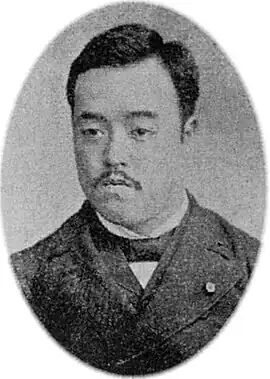Ogasawara Tadanobu | |
|---|---|
 | |
| 10th Daimyō of Kokura | |
| In office 1865–1871 | |
| Preceded by | Ogasawara Tadayoshi |
| Succeeded by | none |
| Personal details | |
| Born | March 8, 1862 |
| Died | February 6, 1897 (aged 34) |
| Nationality | Japanese |
Count Ogasawara Tadanobu (小笠原 忠忱, March 8, 1862 – February 6, 1897) was a Japanese samurai daimyō of the late Edo period. He was the head of Kokura Domain.[1][2]
Ogasawara clan genealogy
Tadanobu was part of the senior branch of the Ogasawara clan.[3]
Tadanobu's branch of the clan were daimyō at Kokura Domain (150,000 koku)[4] in Buzen Province.[3]
He was a (count (伯爵, hakushaku)) in the kazoku nobility system. This was because the head of this clan line and his heirs were ennobled in 1884.[5]
Events of Tadanobu's life
During Tadanobu's tenure as clan head, the Kokura domain took part in the shogunate's Chōshū Expeditions, and also destroyed Kokura Castle in 1866 during its retreat to Kawara. He was assisted in day-to-day affairs by his two karō, Komiya Minbu and Shimamura Shizuma. Komiya was the one who took charge of the burning of Kokura Castle and, as the castle was built by the clan's ancestor Ogasawara Tadazane, he committed seppuku in atonement.
For his deployment of troops on the Imperial side during the Boshin War of 1868, Tadanobu received a personal stipend of 5,000 koku from the court.[6]
In the Meiji era, Tadanobu spent a few years studying in Britain, returning in 1878. He held junior 3rd court rank (jusanmi (従三位)).
Ancestry
| Ancestors of Ogasawara Tadanobu | ||||||||||||||||||||||||||||||||||||||||||||||||||||||||||||||||||||||||||||||||||||||||||||||||||||||||||||||||||||||||||||||||||||||||||||||||||||||||||||||||||||||||||||||||||||||||||||||||||||||||||||||||||||||||||||||||||||||||||||||||||||||||||||||||||||||||||||||||||||||||||||||||||||||||||||||||||||||||||||||||||||||||||||||||||||||||||||||||||||||||||||||||||||||||||||||||||||||||||||||||||||||||||||||||||||||||||||||||||||||||||||||||||||||||||||||||||||||||||||||||||||||||||||||||||||||||||||||||||||||||||||||||||||||||||||||||||||||||||||||||||||||||||||||||||||||||||||||||
|---|---|---|---|---|---|---|---|---|---|---|---|---|---|---|---|---|---|---|---|---|---|---|---|---|---|---|---|---|---|---|---|---|---|---|---|---|---|---|---|---|---|---|---|---|---|---|---|---|---|---|---|---|---|---|---|---|---|---|---|---|---|---|---|---|---|---|---|---|---|---|---|---|---|---|---|---|---|---|---|---|---|---|---|---|---|---|---|---|---|---|---|---|---|---|---|---|---|---|---|---|---|---|---|---|---|---|---|---|---|---|---|---|---|---|---|---|---|---|---|---|---|---|---|---|---|---|---|---|---|---|---|---|---|---|---|---|---|---|---|---|---|---|---|---|---|---|---|---|---|---|---|---|---|---|---|---|---|---|---|---|---|---|---|---|---|---|---|---|---|---|---|---|---|---|---|---|---|---|---|---|---|---|---|---|---|---|---|---|---|---|---|---|---|---|---|---|---|---|---|---|---|---|---|---|---|---|---|---|---|---|---|---|---|---|---|---|---|---|---|---|---|---|---|---|---|---|---|---|---|---|---|---|---|---|---|---|---|---|---|---|---|---|---|---|---|---|---|---|---|---|---|---|---|---|---|---|---|---|---|---|---|---|---|---|---|---|---|---|---|---|---|---|---|---|---|---|---|---|---|---|---|---|---|---|---|---|---|---|---|---|---|---|---|---|---|---|---|---|---|---|---|---|---|---|---|---|---|---|---|---|---|---|---|---|---|---|---|---|---|---|---|---|---|---|---|---|---|---|---|---|---|---|---|---|---|---|---|---|---|---|---|---|---|---|---|---|---|---|---|---|---|---|---|---|---|---|---|---|---|---|---|---|---|---|---|---|---|---|---|---|---|---|---|---|---|---|---|---|---|---|---|---|---|---|---|---|---|---|---|---|---|---|---|---|---|---|---|---|---|---|---|---|---|---|---|---|---|---|---|---|---|---|---|---|---|---|---|---|---|---|---|---|---|---|---|---|---|---|---|---|---|---|---|---|---|---|---|---|---|---|---|---|---|---|---|---|---|---|---|---|---|---|---|---|---|---|---|---|---|---|---|---|---|---|---|---|---|---|---|---|---|---|---|---|---|---|---|---|---|---|---|---|---|---|---|---|---|---|---|---|---|---|---|---|---|---|---|---|---|---|---|---|---|---|---|---|---|---|---|---|---|---|---|---|---|---|---|---|---|---|---|---|---|---|---|---|---|---|---|---|---|---|---|---|---|---|---|---|---|---|---|---|---|---|---|---|---|---|---|---|---|---|---|---|---|---|---|---|---|---|---|---|---|---|---|---|---|---|---|---|---|---|---|---|---|---|---|---|---|---|---|---|---|---|---|---|---|---|---|---|---|---|
| ||||||||||||||||||||||||||||||||||||||||||||||||||||||||||||||||||||||||||||||||||||||||||||||||||||||||||||||||||||||||||||||||||||||||||||||||||||||||||||||||||||||||||||||||||||||||||||||||||||||||||||||||||||||||||||||||||||||||||||||||||||||||||||||||||||||||||||||||||||||||||||||||||||||||||||||||||||||||||||||||||||||||||||||||||||||||||||||||||||||||||||||||||||||||||||||||||||||||||||||||||||||||||||||||||||||||||||||||||||||||||||||||||||||||||||||||||||||||||||||||||||||||||||||||||||||||||||||||||||||||||||||||||||||||||||||||||||||||||||||||||||||||||||||||||||||||||||||||
References

- ↑ Edmond Papinot. (1906). Dictionnaire d’histoire et de géographie du Japon. digitized 1906 Nobiliaire du japon (2003)
- ↑ Edmond Papinot (2003). "Terazawa" in Nobiliare du Japon. pp. 44–45.
- 1 2 Appert, Georges (1888). Ancien Japon. Kokobunsha. p. 75.
- ↑ "Kokura Castle," Kitakyushu Bridges, p. 2; Kokura Castle. Archived March 21, 2008, at the Wayback Machine
- ↑ "Nobility, Peerage and Ranks in Ancient and Meiji-Japan", p. 21.
- ↑ Ogasawara Tadanobu, notes (in Japanese). upp.so-net.ne.jp
- ↑ "Ogasawara-Kokura genealogy". Reichsarchiv (in Japanese). Retrieved January 16, 2018.
Further reading
- Nussbaum, Louis-Frédéric. (2002). "Ogasawara". Japan Encyclopedia. Cambridge: Harvard University Press. ISBN 978-0-674-00770-3
- Varley, H. Paul. (1965). The Onin War: History of Its Origins and Background with a Selective Translation of the Chronicle of Ōnin New York Columbia University Press. ISBN 978-0-231-02943-8 (cloth)
See also
- (in Japanese) Biography of Tadanobu (September 28, 2007)